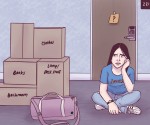Nothing describes Westwood better than its “Hunger Games” of a housing market. And nobody knows the fight for security better than UCLA’s resident assistant applicants, who are forced to fight for a place to live.
The RA application for the 2019-2020 school year was due Jan. 4, before the start of winter quarter classes. After a grueling interview process, offers are finally sent halfway through February – the middle of Westwood’s notorious apartment-hunting season.
Many Westwood landlords and housing companies have units filling up as early as January, with waitlists overflowing by the end of the month. It is even more difficult to find available housing in February. Students applying to be RAs have few options to navigate the market without losing their money, jobs or homes – maybe even all three.
Prospective RAs are thus caught in a catch-22, in which they are forced to choose between signing a lease to secure an apartment and gambling their livelihood on whether they will be eligible for an RA position.
Students effectively must choose between certain, but expensive housing, or uncertain, yet free room and board. UCLA Housing and UCLA Residential Life need to realize the fear and stress students face because of this arbitrary deadline and move the deadline up much earlier.
The decision to secure off-campus housing is often made as students who want to live with roommates find themselves in a situation in which they can’t all sign their lease to guarantee a unit when one of them is still waiting on results from the RA application process.
Gareema Agarwal, a second-year neuroscience student, said the delay in her application results has complicated and delayed her roommate group’s apartment search, since the difference in one roommate can affect rent costs for everyone else.
“I’ve felt like a burden on my potential roommates since there’s been so much uncertainty about my application status,” Agarwal said.
Even if students proceed in apartment hunting with their potential roommates, they lose both time and money through tenuous deposits and application fees. Holding deposits, which can provide apartment guarantees anywhere from 24 hours to a few days, don’t provide potential RAs enough time to wait for confirmed answers from ResLife.
This problem is even more extreme for students left on the RA waitlist. With no idea if they’re likely to move off it or not, they face being left virtually homeless unless they quickly commit to an apartment.
Miya Eberlein, a fourth-year molecular, cell, and developmental biology student, said she didn’t learn she was on the waitlist until April. But, she remained on it because she was offered a second round of interviews to potentially move off the waitlist in June.
“I found out that I didn’t get it on June 20, 2018, but they still left me on the waitlist,” she said, “I thought I could just commute, but I realized I needed to be close to campus.”
She desperately scrambled online, scoured the UCLA Free & For Sale Facebook page for potential roommates and luckily found some willing students and joined their lease. Students who live far from campus either have to endure a daily commute or likewise have to look for an apartment as school begins.
ResLife said in an official statement that it removed the waitlist this year and created an intern position, in which students are trained alongside RAs to step in if there are potential midyear vacancies. But this still keeps students trapped in the RA application process as an alternate, since midyear vacancies are extremely rare, all while preventing them from finding off-campus housing.
The stress, uncertainty and basic concerns of this precarious housing dilemma can be avoided if ResLife and Housing move the application due date up to fall quarter. Katherine Alvarado, assistant director of UCLA Media Relations, said ResLife moved the deadline from fall to winter a few years ago to benefit students still adjusting to life at UCLA. Yet, this becomes more burdensome as students begin to think about off-campus housing as upperclassmen.
“Moving up the deadline would help people who have unforeseen circumstances with housing or those who are stuck on the waitlist,” Eberlein said.
If students have a more definitive idea of their RA application results before winter quarter, they can move forward looking for apartments without the fear of losing a future job or capitulating to undesirable living conditions just days before the academic year begins.
Moreover, ResLife said it needs time to manage and implement the RA process, as it reviews data from students’ previous years to help with recruitment. By proactively analyzing this data over summer, ResLife can review current application information over winter break and have more time to train new recruits – a win-win for students and UCLA.
Although some students may not fear the unavailability of housing because they apply to live on the Hill as second- or third-years, many upperclassmen tend to gain interest in living off campus. Not to mention, there’s only a three-year housing guarantee, so fourth-years who face this dilemma also have to worry about whether they’ll be selected in the university housing lottery.
A small adjustment to the timeline of RA applications could drastically improve students’ ability to secure housing.
And that security can be the difference between giving back to UCLA as a residential employee or being fed to the Westwood housing market piranhas.
